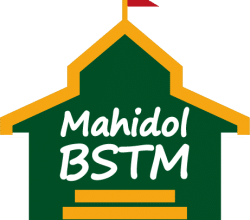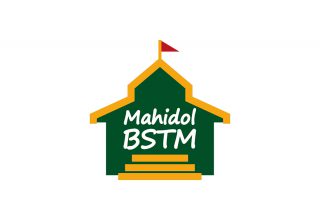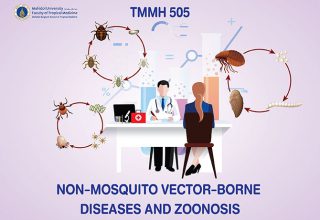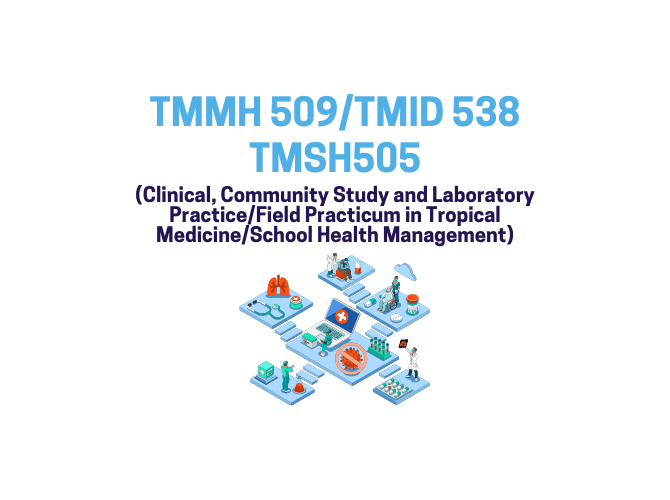Course Description
(TMMH 509) Clinical practice in hospitals and in endemic areas, epidemiology survey, community lifestyles that affect health, patient referral system, community health care and practice laboratory tests
(TMID 538) Planing, integration of knowledge and skills in infectious agents in tropic; Detection and analysis of disease vectors; Host and socio- environmental factors affecting disease occurrence and transmission; Diagnosis; Risk communication; Disease prevention by community participation
(TMSH 505) The school health management; policy and action plans; analyses of school situations and environment; the activity development; the school health program assessment; virtue and ethics of school health personnel; the field practice of students in the selected schools
Course Objectives
TMMH509
1.Apply knowledge how to plan and work in the community in order to get information about the situations of parasitic infections including medical vectors distributed in the studied area
2.Describe how people in the studied area can get infection and understand the primary medical care service with referring system.
3.Apply knowledge on tropical diseases in term of proper investigation, management, provide health education including prevention and control of the diseases.
4.Provide experiences of working as a team for the future collaboration.
TMID538
1. Has thoroughknowledge and critical understanding of principal concepts of tropical diseases and principles and current applications of diagnostic tools, risk analysis and communication to field practicum. Consistently applies practical and theoretical knowledge in dealing with a wide variety of issues and health problems at the community level.
2. Accepts full responsibility for own work and cooperates fully and constructively with others in dealing with issues and problems, exercising both informal and formal leadership and managerial skills where appropriate.
3. Acquire, critically evaluates, and makes effective use of mathematical and statistical data, and uses a wide range of appropriate information and technology to communicate for health risk and recommendations for community prevention to various targets.
4. Actively encourages others to apply sound ethical and moral judgments in dealing issues affecting themselves and others and exercises leadership in promoting sound ethical and moral practices in field practicum environment and the wider community.
TMSH505
1. Describe the principles on school-health-based research
2. Develop research plan for the school health issues
3. Conduct a pilot study on school health issues
4. Analyze and interpret the results from the pilot study
Course-level Learning Outcomes: CLOs
At the end of the course, the students should be able to
TMMH509
CLO1: Approach the community with common tropical diseases presented in studied ar-ea.
CLO2: Distinguish the diagnosis of patients with tropical infectious disease, especially ma-laria, intestinal parasitic infections and common tropical infectious diseases in the community
CLO3: Plan for the investigations, treatment and generate the proper advice for the community with tropical infectious diseases.
CLO4: Discuss about the relationship among hosts, pathogens and environment.
TMID538
CLO1: Integrate fundamental knowledge and skills in pathogens, hosts and vectors and socio-environmental factors of tropical diseases in field practice
CLO2: Plan for community communication on risk and prevention of tropical diseases
CLO3: Participatory work with multi-disciplinary team and community for tropical disease identification and prevention
CLO4: Persuade multi-disciplinary team and community with respect to their personality, culture and belief
TMSH505
CLO1: Describe the principles on school-health-based research
CLO2: Develop research plan for the school health issues
CLO3: Conduct a pilot study on school health issues
CLO4: Analyze and interpret the results from the pilot study
- 18 Sections
- 11 Lessons
- 52 Weeks
- TMMH509/TMID538/TMSH505 All VDO1
- TMMH509/TMID538/TMSH505-(01) Introduction to Clinical, Community study and Laboratory practice Overview/working flow/expected outcome1
- TMMH509/TMID538/TMSH505 Guideline for community participation and risk communication1
- TMMH509/TMID538/TMSH505-02 Design of survey on knowledge, perception and practice of risk for tropical diseases2
- TMMH509/TMID538/TMSH505-03 Basic epidemiological approaches and statistics for data collection1
- TMMH509/TMID538/TMSH505-04 Workshop Mobile Based GIS0
- TMMH509/TMID538/TMSH505-05 Review and revise questionnaire survey0
- TMMH509/TMID538/TMSH505-06 Laboratory Demonstration: Detection of Ectoparasites, larval survey, trapping3
- TMMH509/TMID538/TMSH505-07 Water sampling & water quality assessment1
- TMMH509/TMID538/TMSH505-08 Demonstration of blood parasite and blood film morphology for Malaria and Dengue and Filarial infection0
- TMMH509/TMID538/TMSH505-09 [Laboratory Practice] Blood Examination for Malaria Dengue and Filaria0
- TMMH509/TMID538/TMSH505-10 Lecture and Demonstration of intestinal parasites0
- TMMH509/TMID538/TMSH505-11 Practice Stool Examination I: Kato thick smear, direct smear, Kato-Katz technique1
- TMMH509/TMID538/TMSH505 (12) Practice Stool Examination II: Stool Examination II: Stool concentration technique0
- TMMH509/TMID538/TMSH505-13 Field Trip I (Survey): Study of Health Care System in the Community0
- TMMH509/TMID538/TMSH505-14 Student planning I for field practicum0
- TMMH509/TMID538/TMSH505-15 Student presentation for Field practicum Plans0
- TMMH509/TMID538/TMSH505 Field Trip III: Field Work for Parasites and Vector Survey in the Community0




